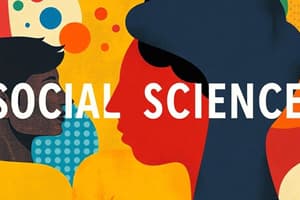Podcast
Questions and Answers
What is a primary focus of political science?
What is a primary focus of political science?
- Analysis of economic trends
- Examination of political systems and governance (correct)
- Study of individual psychological behavior
- Understanding cultural variations in society
Which of the following best describes the methodologies employed in political science?
Which of the following best describes the methodologies employed in political science?
- Reviewing historical documents exclusively
- Only qualitative methods are used
- Both qualitative and quantitative analyses are employed (correct)
- Only statistical analysis is considered valid
What aspect of politics involves the examination of power distribution and decision-making processes?
What aspect of politics involves the examination of power distribution and decision-making processes?
- Political ideologies
- Political institutions (correct)
- Political economy
- Political behavior
Which of the following political ideologies is characterized by a strong centralized government and limited political freedoms?
Which of the following political ideologies is characterized by a strong centralized government and limited political freedoms?
How does political science typically analyze the influence of individual political actors?
How does political science typically analyze the influence of individual political actors?
What is the relationship between political systems and cultural factors in political science research?
What is the relationship between political systems and cultural factors in political science research?
Which of the following concepts is NOT typically analyzed within political science?
Which of the following concepts is NOT typically analyzed within political science?
What do political scientists seek to understand through the study of political conflicts?
What do political scientists seek to understand through the study of political conflicts?
Flashcards
Social Science
Social Science
The study of society and human behavior using scientific methods.
Political Science
Political Science
The study of governments, power, and political systems.
Social Structures
Social Structures
Organized patterns of relationships among individuals in society.
Political Institutions
Political Institutions
Signup and view all the flashcards
Scientific Methods
Scientific Methods
Signup and view all the flashcards
Social Inequality
Social Inequality
Signup and view all the flashcards
Power Dynamics
Power Dynamics
Signup and view all the flashcards
Political Ideologies
Political Ideologies
Signup and view all the flashcards
Social Behavior
Social Behavior
Signup and view all the flashcards
Political Systems
Political Systems
Signup and view all the flashcards
Study Notes
Social Science
- Social science is an academic discipline that uses scientific methods to study society and social behavior.
- It encompasses multiple fields, including sociology, anthropology, psychology, economics, political science, and geography, among others.
- Key methods include observation, surveys, experiments, and statistical analysis.
- Focuses on understanding social structures, processes, and patterns of behavior.
- Explores diverse topics such as social inequality, cultural variations, and the impact of social institutions.
- Aims to provide insights into human social interaction and collective action.
- Often examines the relationship between individuals and the institutions and systems they inhabit.
- Studies how cultures and societies influence individual behavior and values.
- Addresses issues of social justice, equality, and human well-being.
- Seeks causal explanations and generalizable findings about social phenomena.
- Utilizes rigorous methodologies to minimize bias and enhance validity in research.
- Sub-disciplines within social science often overlap, drawing on and informing each other.
Political Science
- Political science is a social science discipline that examines the theory, practice, and behavior of political systems.
- It analyzes diverse aspects of politics, such as power, governance, elections, and international relations.
- Investigates the distribution of power, decision-making processes, and the role of institutions in shaping political outcomes.
- Examines various political ideologies, theories, and concepts, including democracy, authoritarianism, liberalism, and socialism.
- Analyzes the dynamics of power and the processes through which individuals and groups influence policies and decisions.
- Studies political conflicts, negotiations, and agreements at all levels of government.
- Explores the structure and functions of governments, political parties, and advocacy groups.
- Analyzes the roles of individual leaders, political actors, and their impacts on society.
- Investigates the relationship between political systems and economic, social, and cultural factors.
- Employs diverse methodologies to research political phenomena, such as qualitative and quantitative analysis, case studies, and discourse analysis.
- Aims to understand political processes and explain political phenomena to provide clarity on societal issues.
- Seeks to provide knowledge to enhance governance, improve democratic processes, and promote peace and security.
- Examines the impact of political factors on social, economic, and cultural environments.
Studying That Suits You
Use AI to generate personalized quizzes and flashcards to suit your learning preferences.




